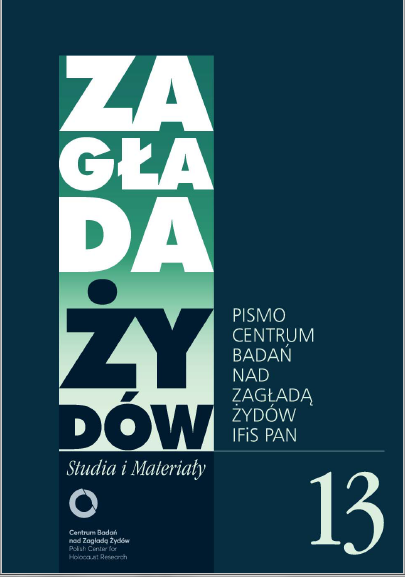Kierunki, cele i rezultaty działań Służby Bezpieczeństwa PRL wobec Żydowskiego Instytutu Historycznego (1961–1970)
Directions, Objectives, and Effects of the Activity of the Security Service in Communist Poland Undertaken Regarding the Jewish Historical Institute (1961–1970)
Author(s): Tadeusz Paweł RutkowskiSubject(s): Post-War period (1950 - 1989), History of Communism, History of Antisemitism
Published by: Stowarzyszenie Centrum Badań nad Zagładą Żydów & IFiS PAN
Keywords: Jewish Historical Institute; Bernard Mark; March 1968; communist Poland’s Security Service;
Summary/Abstract: An institution maintaining contacts with foreign scholars and the Jewish Diaspora around the world, the Jewish Historical Institute (Żydowski Instytut Historyczny, ŻIH) became an object of interest of the Security Service (Służba Bezpieczeństwa, SB) in the early 1960s. The initial objects of surveillance were the ŻIH Director, Professor Bernard Mark, and his Deputy, Adam Rutkowski, for it was established that they maintained contacts with a number of foreigners and transferred information detrimental to People’s Poland. 13 October 1952 marked the registration of investigation code name ‘Kodak’, within the framework of which the SB counterintelligence (MSW Department II Section V) carried out surveillance of the ŻIH. Aside recruiting agents, mostly among the technical employees of the ŻIH, the SB used technical methods of surveillance (telephone and room tapping, correspondence control) towards the Institute and its employees. There were also several instances of secret entering the Institute to photograph documents. In 1965 all those actions led to a proposition formulated by the SB officer who was in charge of the investigation to accuse the Institute’s management of irregularities in employee remuneration so as to tarnish its reputation and exchange the ŻIH scholarly team for individuals of Jewish nationality loyal to the authorities. Those plans were not realized though, with the MSW Department III Section III, which carried out anti-opposition activity, taking over the surveillance of the ŻIH in 1965. The condition of the surviving operational materials does not facilitate a detailed analysis of the 1967–1968 surveillance of the ŻIH, but it was largely unsuccessful. Paradoxically, the SB learned more about the ŻIH’s situation after state institutions took interest in the Institute’s activity (particularly the Supreme Audit Office [Najwyższa Izba Kontroli, NIK]), beginning with the autumn of 1967. Similarly, research conducted so far does not make it possible to determine the SB’s influence on the activity of those institutions and communist Poland’s policy regarding the ŻIH, but it seems highly probable that the actions aiming at liquidation of the ŻIH undertaken in 1968 were inspired by the SB.
Journal: Zagłada Żydów. Studia i Materiały
- Issue Year: 2017
- Issue No: 13
- Page Range: 160-180
- Page Count: 21
- Language: Polish

